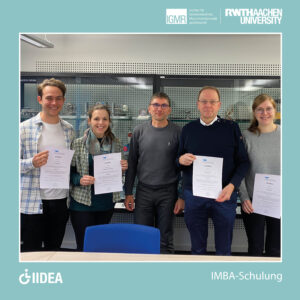Schlagwort: ‘Aufgabenplanung’
IMBA training for the IIDEA project team

Our IIDEA-project team took part in a training course on the “Integration of people with disabilities into the world of work” (IMBA).
IMBA is positioned at the interface of medical and occupational rehabilitation and enables a precise description and comparison of work requirements and human abilities. The training covered the basics of IMBA, with a particular focus on the defined characteristics that serve as the basis for the assessment of work requirements and abilities. A highlight of the training was the introduction to the “Marie Plus” software, which is closely linked to the IMBA concept. The training was conducted by Torsten Alles, Ph.D., Managing Director of iqpr. His extensive knowledge and experience helped to emphasize the importance of IMBA in occupational therapy and activity-based medical rehabilitation.
We are convinced that this training will support our previous research and make a valuable contribution to the IIDEA project. We are grateful for the expertise we have gained through this training and look forward to applying the acquired knowledge in our daily work.
contact person:
Mathias Hüsing
Carlo Weidemann
Elodie Hüsing
Sophie-Charlotte Keunecke
Christina Jansen
Robot Cooking – Transferring observations into a planning language
Transferring observations into a planning language: An automated approach in the field of cooking
In the Robot Cooking project, an automated method is developed to analyze and identify motion data and convert it into a machine-readable planning language. This is done using a cooking scenario as an example in which the motion data is captured by recording the hand pose of the cook.
The recording is done using a motion capture system consisting of seven cameras and a glove with three markers on the back of the chef’s hand. The position of the markers is determined by triangulation. This provides enough information to derive the hand pose. The recording is done at 120 frames per second. Before the cooking process, all objects in the workspace are identified and their initial positions determined. Motion data is continuously recorded and converted into poses with time stamps. Additional information such as velocity, acceleration and angle in relation to the tabletop are derived from the raw data.
A initial structure of the dataset is created by finding the side actions using classification. Here, pick, move and place are identified as recurrent side actions. A separate training dataset is used to train a classifier that recognizes these actions. This enables an easier analysis of the remaining actions.
Clustering is applied to identify unknown actions. A dynamic approach allows analysis despite high variability in execution. A unique fingerprint for each action is found, based on the orientation of the back of the hand and its speed on the table plane, to assign each frame to a cluster and finally to an action.
The knowledge gained from classification and clustering is translated into a machine-readable Planning Domain Definition Language (PDDL). A schedule is created, with known actions directly assigned. Start and end positions are specified, and virtual object tracking is used to represent the progression of objects during cooking. For unknown actions, preconditions and effects are handled dynamically. The results are translated into a machine-readable PDDL. This formal representation enables efficient automatic scheduling and execution of the previously demonstrated cooking task.
Additional information is available in the video linked above, the poster and the paper.
Contact:
Markus Schmitz
IGMR Seminar: Dr. Michael Cashmore – Plan-Based Robot Control in Real-Time
Mit dem Vortrag von Dr. Miachel Cashmore von der University of Strathclyde startet die virtuelle IGMR Vortragsreihe im Wintersemester 20/21. Wir freuen uns auf einen Einblick in ROSPlan und Plan-Based Robot Control in Real-Time.
Mittwoch, 2. Dezember 2020 16:30 Uhr in Zoom Zoom Meeting Informationen: https://rwth.zoom.us/j/98454895570?pwd=NkpiSWkyaTJtdWlralJrSUtnMDdDZz09 Meeting-ID: 984 5489 5570, Kenncode: 186393
Die Datenschutzhinweise zur Nutzung von Zoom und eine Handreichung für Teilnehmer (Studierende) können von den Seiten des CLS der RWTH Aachen University heruntergeladen werden.
The topic of the seminar will focus on the numerous temporal and numeric challenges that arise in plan execution. If a plan is produced with some flexibility, how it can be executed? In this context the properties of temporal controllability, robustness envelopes, replanning in-situ, and planning concurrently to execution, deliberation in a system of distributed components, in which your actions can affect other parts of a larger system will be discussed.
Die Veranstaltungen im Wintersemester 2020/2021 werden in Zusammenarbeit mit dem VDI-GPP-Arbeitskreis des Bezirksvereins Aachen durchgeführt.




